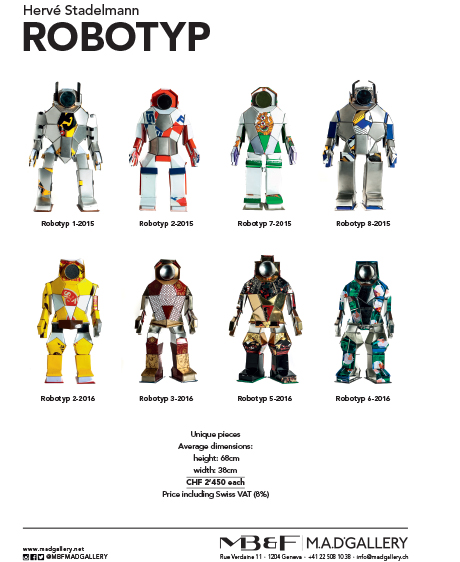
Hervé Stadelmann
The M.A.D.Gallery proudly presents an exceptional exhibit of robotic sculptures representing the very epitome of cool: virtuoso Hervé Stadelmann merges his gifted ability to work with his hands as a tinsmith with a keen eye for graphic design.
Born in 1978, Hervé Stadelmann is a native of Switzerland. Early in life, he found enjoyment in working with his hands as well as a love for graphic design. Taking the steps to formally develop these qualities, Stadelmann earned his certificat fédéral de capacité (CFC) in tinsmithing at the School of Arts et Métiers in Moutier in 1997. This was followed in 2005 by a CFC in graphic design at the art school in La Chaux-de-Fonds, which included an extraordinary opportunity for an internship in Moscow.

Stadelmann’s typography and drawings have been published in Swiss and Russian publications and his work has received awards in Europe and Switzerland.
Merging his many artistic talents, Stadelmann began working independently in 2005 as well as working as graphic designer, communications manager, and artistic director for a diverse clientele. Today, he still works independently with a focus on design and sculpture.
“In 2015, I realized a large number of robot sculptures because people close to me also wanted to have a robot at home. These sculptured robots allow me to mix my two jobs and just have one,” Stadelmann sums up.
ROBOTYP
“One evening in November of 2014, I was in the middle of making small metal skulls using the least possible parts and I got tired of it,” Stadelmann explains how the idea for the robot figures got underway.
“So I told myself that I would start a sculpture of something abstract without knowing where I was going. It was only a moment before the abstract sculpture began to look like a robot and I thought, ‘yes, good idea’.”
It didn’t take long before this caught on locally, and Stadelmann realized that this was something he could develop.

No two of his robots are alike. Every meticulous fold of metal undergoes careful consideration of placement to highlight the patterned, colourful, or monochromatic materials in an artistic way. Concurrently, this generates unique traits for each robot.
For example, one may have antennae or what appears to be a classically Egyptian- style headdress, while others might be set apart with vibrant colour patterns flaunted across the chest or a monochromatic copper tone. Stadelmann’s constructions also bring new life to familiar materials such as Pepsi and Heineken service trays. He manipulates the metal into what appear to be folds combining them to form unique robot sculptures.
Although immobile, the robotic sculptures make powerful visual impressions thanks to both their individual characteristics and their sizable dimensions. Standing at an average of 70 centimetres tall – slightly more than two feet – the robots quickly become the focal point of any space and are sure to provoke interesting conversations. Even though Stadelmann’s sculptures are not toys, they do appeal to the inner child in everyone, making them a perfect fit for the MB&F M.A.D.Gallery.
Stadelmann has crafted an army of 16 individually numbered robot sculptures for the M.A.D.Gallery; the appearance of each varies greatly from one to the other, and unmistakable personalities are easily discerned. Exuding a distinctive origami vibe thanks to the multitude of bends and folds demonstrating his metallurgic expertise as well as a talent and a passion for design, the Robotyps’ intricate compositions proudly display their repurposed origins, whether these come from what may appear to be a patriotic Pepsi service tray or the tin of an exotic batch of Asian teas.
And if you look close enough you might even discern a hint of superhero greatness!
PROCESS
Stadelmann creates his fleet of robot sculptures entirely by hand in his studio in La Chaux-de-Fonds, Switzerland, the heart of watchmaking country. Assembling one sculpture resulting in a robot with an average height of 70 centimetres and width of 40 centimetres requires two square metres of sheet metal and about 80 hours of painstaking work.
“My inspiration is guided by the graphics, typography, and textures on the sheets of metal I find. The main point is to find a sheet metal plate that inspires me. As soon as I have that, work can begin,” the Swiss creator born in the groovy 1970s explains.

The metal sheets used to create the robot sculptures are often discovered on Stadelmann’s countless journeys to flea markets or may even be found discarded in the streets.
He often repurposes materials from tea boxes, cookie tins, branded service trays, and traffic signs in metals ranging from copper and stainless steel to tin, aluminium, and zinc. “I almost only use repurposed materials that are of diverse thicknesses,” the studied graphic artist explains.
The selected material sets the stage for the sculpture’s design; the cuts and folds of the metal are perfectly placed to express the robot’s personality with bold patterns. The structure is sturdy to match the powerful design, making you wonder if each robot might just have hidden powers.
“I have a vital need to work with my hands,”
he says. As a trained tinsmith Stadelmann makes use of basic tools such as pliers, shears, and hammers to create the intricate bends and fittings by hand; no electric tools or machines are used in the creation of his completely handmade sculptures.
The most difficult step in completing the robot sculpture is the interior assembly: if the pieces are not precise enough, it does not work. Adding to the difficulty level, all the materials vary in thickness and strength, which then requires each robot sculpture to have its own individual set of blueprints.



